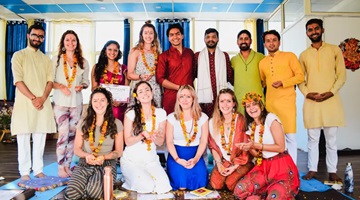10 Things You Should Know Before Visiting Rishikesh

Whether you're coming for a yoga teacher training, a spiritual retreat, or just to soak in the Himalayan vibes, Rishikesh has a special way of leaving a lasting imprint on your soul. With the sacred Ganges flowing through, chants echoing from ashrams, and vibrant street life all around, this spiritual town is both enchanting and unpredictable.
After spending even a few weeks here, you’ll find yourself learning, growing, and connecting—not just with others, but with yourself. But before you zip up your backpack, here are 10 things you should know before visiting rishikesh to help you prepare for your time in India’s yoga capital.
1. Yoga Capital of the World

Rishikesh isn’t just a place—it’s a pilgrimage for the soul. Often referred to as the Yoga Capital of the World, its connection to yoga runs deep, stretching back over 5,000 years. Ancient scriptures describe sages and rishis meditating along the banks of the sacred Ganges River, seeking enlightenment and divine wisdom.
This rich spiritual legacy, paired with the town’s majestic Himalayan setting and serene riverbanks, makes Rishikesh a global magnet for seekers, yogis, and teachers alike.
Today, the town is home to hundreds of yoga schools and holistic centers, where students can dive into a vast range of practices and disciplines, including:
-
Yoga Teacher Training (200hr, 300hr, 500hr)
-
Ayurveda and Yogic Nutrition
-
Vedic Philosophy and Astrology
-
Meditation and Mindfulness
-
Sound Healing and Reiki
-
Mantra Chanting and Pranayama
Whether you're here to deepen your personal practice or become a certified teacher, Rishikesh offers an immersive, transformational experience—where ancient tradition meets modern learning in the most authentic way possible.
2. Extend Your Visa for More Flexibility

When applying for your Indian visa, opt for a longer duration than just 30 days. Surprisingly, there’s often little to no price difference between a 1-month and a 1-year e-Tourist visa.
Why choose the extended option?
-
It gives you flexibility to explore India before or after your training
-
You’ll avoid the stress of rushing your return or scrambling for an extension
-
You’ll have the freedom to travel, rest, or even take additional courses at your own pace
Pro Tip: A 1-year multiple-entry visa is ideal for yoga students—it’s affordable, and lets you come and go with ease.
Planning ahead with a longer visa means more peace of mind—and more time to soak in the beauty and teachings of India.
3. Adventure Capital of India

While Rishikesh is globally renowned for its spiritual essence and yogic heritage, it’s also earned a bold reputation as the Adventure Capital of India. Nestled in the foothills of the Himalayas and bordered by the roaring Ganges, Rishikesh offers an adrenaline-fueled counterbalance to its serene spiritual vibe.
For many Indian travelers and thrill-seekers, Rishikesh is a go-to destination for outdoor exploration and high-octane activities, including:
-
White-water rafting down the Ganges—India’s most famous rapids
-
Bungee jumping from India’s tallest jump site
-
Rock climbing and rappelling off Himalayan cliffs
-
Ziplining across breathtaking valleys
-
Trekking through scenic forest trails and mountain ridges
And for nature lovers? Rishikesh offers wildlife safaris where you might spot majestic Asian elephants, leopards, deer, or even the elusive Bengal tiger, all from the safety of a guided safari jeep.
So whether you’re looking for inner peace or an adrenaline rush—or maybe a bit of both—Rishikesh has you covered.
4. Boost Your Gut Health Before Coming to India

If you're traveling from the West, adjusting to Indian cuisine can be a bit of a shock to the system—spicy food, new oils, and unfamiliar microbes can lead to common tummy troubles. But don’t worry—with a little preparation, you can support your gut and enjoy all the flavorful goodness India has to offer.
Start with Probiotics
Begin taking a good-quality probiotic at least two weeks before your trip. This helps build a resilient gut microbiome and gives your body a better chance of adapting to the local cuisine. It’s one of the best ways to prevent digestive issues before they start.
Truth bomb: Even though India is improving in food hygiene, many international travelers still experience food poisoning, especially during the second week of their stay. It’s often not about bad food—it’s about your body adjusting to new spices, ingredients, and bacteria.
Smart Gut-Health Essentials to Pack
-
Probiotics (keep taking them during your trip)
-
Activated charcoal (helps absorb toxins in case of an upset stomach)
-
Ginger chews or tablets (for nausea and digestive relief)
-
Electrolyte sachets (to stay hydrated, especially in the heat)
-
Hand sanitizer & wet wipes (helpful for street food stops)
Good News:
You’ll find plenty of Ayurvedic and allopathic pharmacies in Rishikesh where you can get digestive aids, from Ayurvedic powders to rehydration salts.
Give your gut the care it deserves, and you'll be free to savor every bite of your Indian adventure—without running to the bathroom!
5. Dress Respectfully During Your Stay in Rishikesh

Comfort is key—especially during your Yoga Teacher Training—but so is cultural sensitivity.
Rishikesh is not only a global yoga hub; it’s also a deeply spiritual and traditional town, home to sacred temples, ashrams, and holy ceremonies. That means what you wear matters.
What to Wear for Yoga Classes:
-
Comfortable, breathable yoga wear
-
Avoid overly tight, revealing, or sheer clothing
What to Wear in Public or at Temples:
-
Cover your shoulders and knees (especially during temple visits)
-
Opt for loose, modest clothing like cotton pants, tunics, and scarves
-
Carry a light shawl or wrap—it’s a travel essential and doubles as respectful cover
Dressing respectfully helps you blend in, shows appreciation for the culture, and allows you to participate in local spiritual life with ease and grace.
Bonus: Modest dress also protects you from the sun, bugs, and dust—so it’s a win-win!
6. Be Ready for Local Photographers

One of the more surprising experiences in Rishikesh? You might become the attraction.
Many Indian tourists visiting Rishikesh—especially those from rural areas—may not have encountered foreigners before. As a result, it’s not uncommon for them to ask for photos with you, or in some cases, take pictures without asking.
While some travelers find this curious and light-hearted, others may feel uncomfortable—and that’s completely okay. You are not obligated to say yes.
If you prefer to keep a low profile:
-
Sunglasses and a scarf can help you blend in a bit more.
-
A polite but firm “no” is absolutely acceptable.
-
Don’t hesitate to assert your boundaries if someone is being too persistent.
Remember: curiosity is often the root—but your comfort always comes first.
7. ATMs Are Unreliable — Always Carry Cash

While many cafés, yoga studios, and shops in Rishikesh now accept credit/debit cards or digital payments, cash is still king—and you’ll want to keep some on hand at all times.
There are a few ATMs scattered around:
-
Tapovan (North Bank): 3 ATMs
-
Ram Jhula (South Bank): 3 ATMs
However, don’t count on them being fully stocked or functional. Power outages, network issues, or long queues can leave you stranded without access to cash.
Here’s what you can do:
-
Withdraw a decent amount upon arrival—enough to last for several days.
-
Keep small change for tuk-tuks, snacks, market stalls, and temple donations.
-
If you're staying long-term, set up Paytm or another local digital wallet (or ask a trusted local for help with transfers).
When traveling in Rishikesh, a little preparation goes a long way in keeping your experience smooth and stress-free.
8. Don’t Trust the Monkeys

Monkeys may look cute from a distance—but in Rishikesh, they’re known for being sneaky, bold, and occasionally aggressive. Especially the macaques, who have absolutely no chill when it comes to stealing sunglasses, snacks, or even water bottles.
They're not villains—but they are wild animals, and they know how to spot a tourist from a mile away. Here's how to keep your monkey encounters safe (and drama-free):
Monkey Survival Tips:
-
Don’t make eye contact – Especially with macaques. It’s seen as a challenge, and they never back down.
-
Avoid mother monkeys with babies – They're protective and unpredictable.
-
Hide plastic bags – If it crinkles, they assume it’s fruit. Use a backpack or cloth bag instead.
-
Never feed the monkeys – It disrupts their natural behavior and makes them more aggressive toward humans.
Respect their space, stay aware, and don’t underestimate those adorable faces—Rishikesh monkeys are clever, quick, and not afraid to claim your breakfast biscuit if given the chance!
9. Vegetarian Only – Embrace the Plant-Based Life

If you’re craving burgers or chicken wings, Rishikesh might surprise you—it’s a strictly vegetarian city. As a sacred spiritual destination and the birthplace of yoga, meat, fish, and even eggs are off the menu by law across the entire town.
You’ll find plenty of delicious vegetarian options everywhere, from Ayurvedic thalis and masala dosas to smoothie bowls and veggie-loaded curries.
What about vegan food?
-
Many restaurants do offer vegan-friendly dishes, especially in tourist-friendly areas like Tapovan.
-
However, not all staff may understand what “vegan” means, so you may need to explain clearly—no milk, butter, ghee, paneer, or curd.
Tip: Saying “no dairy” or “no milk products” often works better than just saying “vegan.”
With a little awareness, eating in Rishikesh can be nourishing, flavorful, and deeply aligned with your yogic journey.
10. Rishikesh Is a Dry City — No Alcohol Allowed

Rishikesh isn’t just spiritually sacred—it’s also a legally alcohol-free zone. In keeping with its yogic and religious traditions, the sale and consumption of alcohol is banned within city limits to preserve the area’s purity and sanctity.
You won’t find bars, pubs, or alcohol on restaurant menus. While there are a few bottle shops outside the city, most visitors find the cleanse refreshing, especially when replaced with steaming cups of street-side chai—often more satisfying than a cold beer anyway!
That said, the alcohol ban doesn’t affect the availability of:
-
Great food
-
Shopping
-
Adventure experiences
-
Digital conveniences
Coming to Rishikesh is a chance to reset, reconnect, and rejuvenate—mind, body, and spirit. And being alcohol-free is part of that deeper detox.
Selecting a Location in Rishikesh: Tapovan or Ram Jhula
Choosing where to stay for your Yoga Teacher Training (YTT) in Rishikesh is more important than it may seem. While the city itself isn’t vast, the Ganges River divides it into distinct neighborhoods, each offering a very different atmosphere and experience.
Most yoga schools are concentrated in the far eastern part of Rishikesh, with two main areas to focus on:
-
Tapovan – North of the Ganges
-
Ram Jhula – South of the Ganges
They may appear close on the map, but walking between them can take 30 minutes or more, and navigating by vehicle isn’t always faster due to winding roads and traffic. So your choice of location will deeply shape your YTT experience.
Tapovan – Energetic and Modern
Tapovan is the bustling heart of modern Rishikesh yoga culture. Most yoga schools, cafés, and wellness offerings are located here, making it a popular base for both local and international students.
Why Choose Tapovan?
-
Yoga Hubs Galore: Home to many of Rishikesh’s YTT schools.
-
Plenty to Do: Sound baths, kirtans, meditation drop-ins, and holistic workshops.
-
Café Culture: Great vegan/vegetarian cafés, smoothie bars, and Wi-Fi spots.
-
Adventure Vibes: This is also the center for white-water rafting, trekking, and ziplining.
But...
-
It’s busy, especially during peak season.
-
Motorbike traffic and honking are part of the daily soundtrack.
-
You’ll often bump into curious domestic tourists, some of whom may have never seen a foreigner before (yes, you might get a few stares!).
Ram Jhula – Quiet, Spiritual, and Traditional
Cross the iconic Ram Jhula bridge and you’ll find yourself in an entirely different world. Tucked into the dense forest at the foot of the mountains, Ram Jhula is steeped in spirituality and peace.
Why Choose Ram Jhula?
-
Serene & Sacred: Surrounded by traditional ashrams and steeped in yogic lineage.
-
Fewer Distractions: Fewer cafés, shops, and tourists—more stillness and reflection.
-
Closer to Nature: Forested mountains, quiet Ganga ghats, and plenty of monkeys.
-
Ideal for Immersion: A perfect setting if you’re looking to go inward and focus deeply on your practice.
But...
-
Fewer modern amenities and less nightlife.
-
Less social buzz, which may not suit those craving interaction.
What's Your Reaction?


























